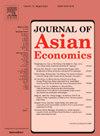Food inflation and monetary policy in emerging economies
IF 2.9
3区 经济学
Q1 ECONOMICS
引用次数: 0
Abstract
The rising inflationary pressure has been linked with supply-side disruptions and rising energy and food prices against the background of the COVID-19 pandemic and the Russia-Ukraine crisis. This paper investigates the role of monetary policy in stabilizing food inflation in emerging economies (India, China, Brazil, Russia, and South Africa). We also investigate the causal linkage between monetary policy and food inflation using frequency domain-based Granger causality and find strong feedback causal effects between food inflation and monetary policy changes. Our results are robust to different estimation methodologies, possible asymmetry, and alternative model specifications, which include climate change. While oil prices, world food prices, and exchange rates have heterogeneous effects on domestic food inflation, a contractionary monetary policy stance leads to a decline in domestic food inflation in all countries. Thus, we provide strong evidence that well-coordinated macroeconomic policies in emerging economies are essential for stabilizing food inflation.
新兴经济体的粮食通胀和货币政策
在 COVID-19 大流行病和俄罗斯-乌克兰危机的背景下,不断上升的通胀压力与供应方中断以及能源和食品价格上涨有关。本文研究了货币政策在稳定新兴经济体(印度、中国、巴西、俄罗斯和南非)粮食通胀中的作用。我们还利用基于频域的格兰杰因果关系研究了货币政策与粮食通胀之间的因果联系,发现粮食通胀与货币政策变化之间存在很强的反馈因果效应。我们的结果对不同的估算方法、可能存在的不对称性以及包括气候变化在内的其他模型规格都是稳健的。虽然油价、世界粮食价格和汇率对国内粮食通胀有不同的影响,但紧缩性货币政策立场会导致所有国家的国内粮食通胀下降。因此,我们提供了强有力的证据,证明新兴经济体协调良好的宏观经济政策对于稳定粮食通胀至关重要。
本文章由计算机程序翻译,如有差异,请以英文原文为准。
求助全文
约1分钟内获得全文
求助全文
来源期刊

Journal of Asian Economics
ECONOMICS-
CiteScore
4.70
自引率
9.40%
发文量
90
期刊介绍:
The Journal of Asian Economics provides a forum for publication of increasingly growing research in Asian economic studies and a unique forum for continental Asian economic studies with focus on (i) special studies in adaptive innovation paradigms in Asian economic regimes, (ii) studies relative to unique dimensions of Asian economic development paradigm, as they are investigated by researchers, (iii) comparative studies of development paradigms in other developing continents, Latin America and Africa, (iv) the emerging new pattern of comparative advantages between Asian countries and the United States and North America.
 求助内容:
求助内容: 应助结果提醒方式:
应助结果提醒方式:


